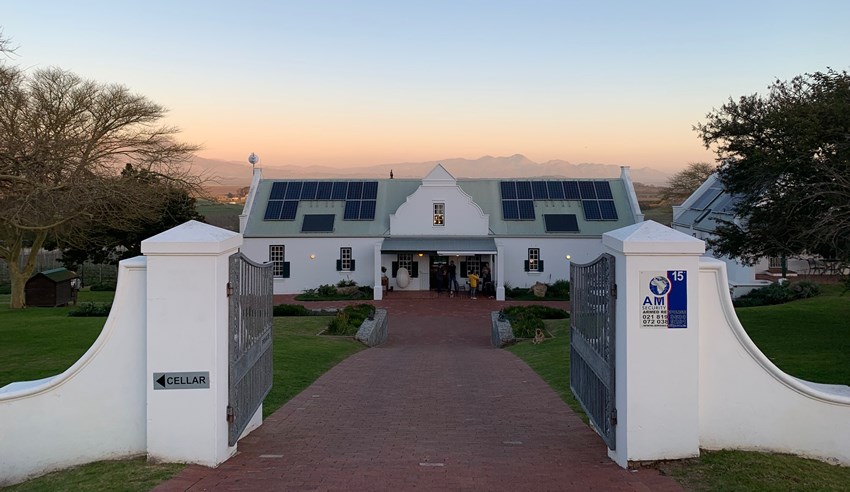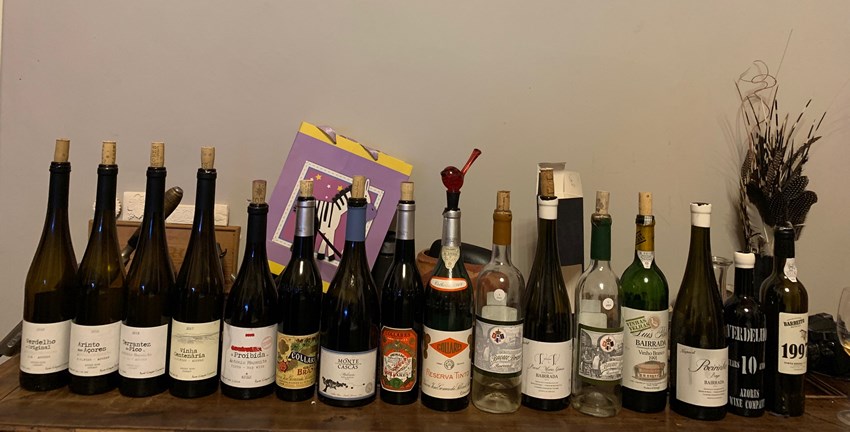The South African wine industry is rich with secret wine tasting societies. There are a number of tasting circles that have been around for decades and they meet out of the public eye, for no other purpose than for the enjoyment of wine and to keep palates and minds sharp.
Chapter one: The Wine Swines. One of the longest running tasting circles; The Wine Swines boasts wall-to-wall heavy weight palates.
Chapter two: The Stellenbosch Circle is one of South Africa’s oldest tasting groups, dating all the way back to 1938. That’s 80 years of commitment.
Chapter three: The Celts
The name says chairman Matthew Copeland (Vondeling) is a reference to the old Celtic warriors that were "civilised" by the Romans who brought wine to England.
Founding member Chris Mullineux (Mullineux & Leeu) explains further: “When we first got together we were all these uncultured, wild students and wine is what cultured us... just as it did with the Celts.
“In 2001 while studying winemaking, a friend of mine's dad Buks Nel was part of a tasting group called the Time Wasters,” Chris continues the story. “He invited me along to one of their tastings and sat next to the likes of Gyles Webb, Colin Collard, Alan Mullins and Clive Torr. I was blown away by the experience of like-minded friends getting together to share funds, experiences and knowledge. It felt like something we should do in our class and I asked a group of classmates to meet up for a tasting one evening. Everybody had to bring sauvignon blanc from a different region and we tasted them blind to see if we could spot the regional differences.”
Trizanne Barnard recalls that first tasting was at their student digs out on the Blaauklippen Road. “Chris invited us, we were all classmates studying Viticulture and Oenology together. It was Chris, Alex, JC, Luca, Nic,a few others, and myself — we've remained as part of the initial group and still taste together now many years later.
We had some incredible tastings when we were younger. At one point the Middelvlei brothers took us under their wing. They even allowed us as uneducated students to pick any wines from their wine library.”
The group has been meeting every month for almost two decades. “Members include producers, marketers, vendors and enthusiasts. It gives us a really broad appreciation of the subject and wines we're evaluating,” says Matthew.
Members include: Alex Starey (Keermont), Trizanne Barnard (Trizanne Signature Wines), Corina Du Toit, Karin Visser, Andrea Mullineux, Chris Mullineux, Nic van Aarde (Oldenburg), Dave Clarke, Jacques de Klerk (Radford Dale /Reverie), Roland Peens, Jeanine Craven, Mick Craven (Craven Wines), Luca Bein (Bein Wines), Clinton le Seur, Ryan Mostert (Silwervis), Adam Mason (Mulderbosch) and JC Steyn (Dornier).
The tasting tonight is taking place at Bein Wine, which is owned by former Swiss vet-doctors Luca and Ingrid Bein who have at least 20 years on the rest — they swapped life in Switzerland for wine studies in Stellies where they met the group.

Each month two members pair up to host and to choose a theme. Tonight is a little bit different as there’s a guest speaker, Joaquim Sá of Amorim. Joaquim is presenting a Portuguese tasting, while Adam Mason and Luca Bein are the official hosts.
“It’s rare for us to have a guest speaker, but it enables us to taste wines and hear insider information that we would otherwise not have had access to,” says Matthew. “We normally present wines and regions we feel strongly about and have first-hand knowledge of.”
We gather in the front room, and Joaquim begins his presentation. “I thought diversity would be a good topic,” he says. But it is always a challenging one, because Portugal has one of the most diverse wine industries in terms of styles, grape varieties and terroir sites. We have 31 regions and more than 260 indigenous cultivars to choose from. So I picked the regions of Azores, Colares and Bairrada.
“All three regions have a stamp of individual brilliance. The volcanic soils of the Azores Islands and the green, woody region of Bairrada produce wines with an amazing sense of place. And then Colares, wines made from vines creeping along the beach sand, metres from the ocean. The last bottle of Madeira wine, made in the Islands off the coast of Africa, shows us that there are wines that live forever.”
After the tasting it’s time to eat. In theme is a flaming dish of chouriço assado: sausage cooked on top of a clay dish that has been filled with booze and then lit.
“I loved the tasting,” says Alex Starey as we mill around the chouriço pyre.“Rare wines that have a very distinctive character. The fact that we heard about ancient viticultural practices was very interesting too. Any wine grown on a small island is always going to appeal to me!
“Over the years we have tasted hundreds of interesting wines and heard about the techniques used to make them. This has broadened our scope of thought about how wine is made immensely. It also gives us a chance to chat about industry news. We are all friends who know each other very well, so we can relax and say what we want about the wines. This leads to good debates and a lot of laughs. The collective wine knowledge and experience is great, so we are constantly learning from each other.”
Is it always amicable? “Funky wines are always a cause for a good fight! Any time there is some unusual bacterial or yeast character on a wine it normally divides the group between natural wine lovers and Brett Police. We have had a few heated debates, but at the end of the day we have a laugh about it.”
Trizanne adds: “The fact that we've been tasting together for the last 19 years, and in a time when we were still studying, starting out careers, starting out families, all quite challenging milestones and yet we still make the time and effort to get together and taste. I think it’s testament to what the group means to each other.”
Tonight’s tasting along with the interaction of the Celts reminds me of this quote:
“We can only truly be civilised people when we have regular and meaningful contact with the wild world.”
Wine and the people who make them and enjoy them, are at the intersection of the wild and the cultured, the natural world, and the refined; the civilised, and the not.
Long may it last.

How does one become a Celts member?
Matthew: We have a capped membership of 18 members, which allows us to pair up and present nine tastings per annum. Nobody has left the group unless they've moved far away. In that case names can be put forward during the AGM at the beginning of each year. New members are then voted on and must be unanimously approved. A single rejection will disqualify a candidate.
Most memorable tastings? The members weigh in:
Matthew Copeland: Georgian wine a few years back. The wines were really far out and mostly unpleasant, but the ones that worked were just insane.
Alex Starey: Too many to remember! Last year, we did a Celts weekend away to Infanta. We drank so many good wines, but the feature tasting was a champagne tasting on a veranda overlooking the bay. As we tasted our way through vintage and Grower champagnes, a pod of dolphins came swimming past. Roland and I won the tasting of the year prize thanks to those dolphins!
Trizanne Barnard: a standout was the Mullineux’s soil tasting this year. It was incredible to hear the in-depth knowledge of their work, their wines, their soils and that they've taken it to the next level of understanding wine and growing vineyards.
Chris Mullineux: There have been many, but the Champagne tasting last year on a beachfront balcony in Infanta will always stay in my memory. The wines were just brillant, and the setting incredible. I think Alex even arranged for dolphins to swim by. Another was an older South African wine tasting hosted by Roland Peens, with wines back to the 1960s. The wines were just singing on the evening (not just the GS that he generously poured!) and I came away super proud and confident in the potential of South African wine.
Adam Mason: I once served a Cabernet Franc from Italy that according to David Clarke was “…the most f#$@g corked wine” of his life. I felt hugely honoured to have been able to impress him in some way. He still talks about it.